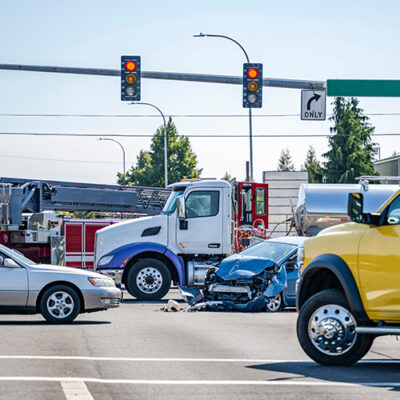 Trucking accidents pose significant legal challenges due to their complex nature and the potential for devastating consequences. As the demand for goods transportation continues to rise, so does the frequency of trucking accidents. Understanding the intricacies of liability in these cases is paramount for victims seeking justice and fair compensation. In this article, we explore the legal landscape surrounding trucking accidents and the key considerations for navigating such cases.
Trucking accidents pose significant legal challenges due to their complex nature and the potential for devastating consequences. As the demand for goods transportation continues to rise, so does the frequency of trucking accidents. Understanding the intricacies of liability in these cases is paramount for victims seeking justice and fair compensation. In this article, we explore the legal landscape surrounding trucking accidents and the key considerations for navigating such cases.
1. Federal Regulations and Compliance:
Trucking operations in the United States are subject to stringent federal regulations established by agencies such as the Federal Motor Carrier Safety Administration (FMCSA). These regulations govern various aspects of trucking, including driver qualifications, vehicle maintenance, hours of service, and cargo securement. Failure to adhere to these regulations can significantly impact liability in the event of an accident.
2. Driver Negligence and Liability:
Driver negligence and liability are crucial aspects of road safety and legal responsibility. Driver negligence refers to the failure of a driver to exercise reasonable care while operating a vehicle, leading to accidents, injuries, or property damage. This negligence can take various forms, such as distracted driving, speeding, driving under the influence of alcohol or drugs, or disregarding traffic signals. In the eyes of the law, drivers have a duty to operate their vehicles safely and responsibly. When they breach this duty and cause harm to others, they can be held liable for their actions. Liability in such cases involves the legal responsibility of the negligent driver to compensate the victims for their injuries, medical expenses, lost wages, and other damages resulting from the accident. Understanding driver negligence and liability is essential for promoting safer driving behaviors and ensuring accountability on the roads.
3. Employer Liability:
Verify the credentials and qualifications of the attorneys. Ensure they are licensed to practice law in New York State and have relevant Trucking companies can be held vicariously liable for the actions of their employees, including truck drivers. Additionally, trucking companies may be directly liable for negligent hiring, inadequate training, or failure to properly maintain their vehicles. Proving employer liability often involves demonstrating that the company failed to exercise reasonable care in hiring, training, or supervising its drivers.experience in handling personal injury cases. Look for any disciplinary actions against them and confirm their standing with the state bar association.
4. Specialization in Personal Injury:
Choose an attorney or a law firm that specializes in personal injury law. Experience in this field equips them with the necessary expertise and insights to handle your case effectively.
5. Product Liability:
In some cases, trucking accidents may result from defects in the vehicle or its components. Manufacturers, distributors, and sellers of defective truck parts may be held liable for injuries or damages caused by those defects. Product liability claims in trucking accidents require a thorough investigation to identify the responsible parties and establish the link between the defect and the accident.
6. Comparative Fault:
Trucking accident cases often involve complex issues of comparative fault, where multiple parties share responsibility for the accident. State laws vary in their approach to comparative fault, with some states allowing recovery even if the plaintiff is partially at fault, while others apply a pure comparative fault system where damages are reduced based on the plaintiff’s degree of fault.
7. Statute of Limitations:
It is crucial for victims of trucking accidents to be aware of the statute of limitations governing personal injury claims in their jurisdiction. Failing to file a claim within the prescribed time frame can result in the forfeiture of the right to seek compensation. Consulting with an experienced attorney promptly after an accident is essential to ensure compliance with statutory deadlines.
8. Conclusion:
Trucking accidents present unique legal challenges that require a comprehensive understanding of federal regulations, liability principles, and state laws. Victims of trucking accidents deserve diligent representation to pursue the compensation they are entitled to for their injuries, medical expenses, lost wages, and pain and suffering. By navigating the legal complexities of trucking accident cases, attorneys play a crucial role in advocating for justice and accountability in the aftermath of these devastating events.

